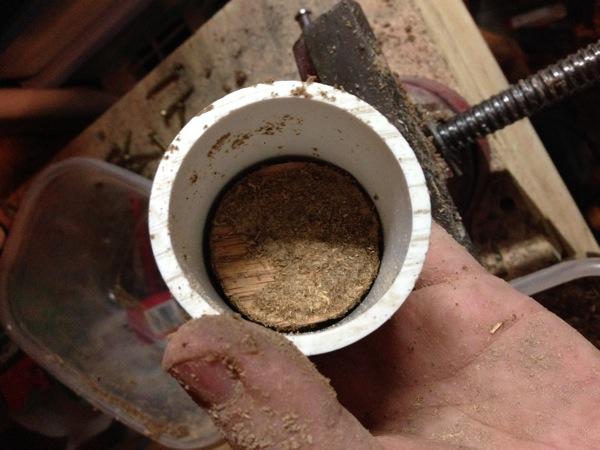I can report some level of success with the first batch, so just passing along an update of my first impressions.
After some more reading and a little experimentation, I took some wood chips and ran them through an old blender, which made a lot of small splintered wood bits. Looks like the longer the blender goes, the finer the wood is ground.
The closest grocery didn't have any potato starch, but I found some gluten-free organic potato flour. The ingredients listed potato starch first, so I figure it must have a lot.
Taking the ground up wood chips, mixing in some water and flour created a very grainy mash. The wood grinds really soak up the water, so I don't think it hurts anything to be liberal with the amount of water. Also, it looks like that the coarser the wood chips, the more potato flour will be needed to create the bond.
Using a 2" PVC pipe and some circles of oak cut to fit inside, I filled up the pipe with some of the mash and pressed it in a vise. This resulted in a bisquette that is a little smaller diameter than an original Bradley bisquette, but about the same thickness.
The bisquette is easy to handle, but if there are big wood splinters, it can easily split along the wood and fall apart, so grinding up for a longer should help.
I tested with and without using the vise... using the vise produces much better results.
The pictures below show the results.
On the far left are the hand squeezed, and the right shows the bisquettes with the vise. The very light colored bisquette is an original Bradley one. Notice how find the chips are in comparison.
There's nothing scientific about what I was doing, so I got some varying thicknesses. So far it hasn't been a problem for the smoker to feed them.
I let these air dry for about a week, and the longer they dried the stronger the bond became and they were easier to handle.
After I picked these up to take to the smoker, I bumped into something and they all fell out of my hands and landed on the floor. The ones pressed by hand (far left in the photo), crumbled when they hit the floor. The ones pressed in the vise stayed together.
Also of note, these were originally air drying outside overnight but it started raining. I ran out to save them and from just the little bit of rain that touched the Bradley bisquettes, they puffed up and completely fell apart. The homemade bisquettes were completely fine.
The wood mixture consisted of hickory chips and black cherry pellets. In the grinder, the black cherry pellets ground up into saw dust, whereas the hickory chips were much harder to grind and turn to splinters.
I've found that ordering bulk pellets is much cheaper than locally purchased chips. What I'll do in the future (after going through all of the chips) is order pellets.
I'm working on the next batch right now. The wood is all ground up to a much finer substance this time... a bit by accident. Some folks crashed their cars in front of the house, I ran out to go see to them (they're fine) and left the blender going for 15 minutes. When I got back the wood was really chewed up.
This batch will be 1/2 hickory, 1/4 black cherry, 1/4 maple.
I haven't added up total costs involved, but it is much, much cheaper than buying. It took me maybe 20 minutes of pressing, while the grinding pretty much happens without direct supervision (multi tasking).





















